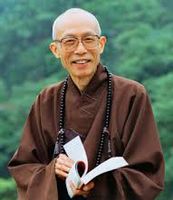Sheng Yen
| English Phonetics | Sheng Yen |
|---|---|
| Chinese Transliteration | Shèngyán |
- Zhang Baokang
- Chang Baokang
| Birth: | 1931/01/22 |
|---|---|
| Death: | 2009/02/03 |
| Place of birth: | Nantong, Jiangsu, China |
Tibetan calendar dates
- Primary Affiliation (Workplace)
- Dharma Drum Mountain (Founder)
- Religious Affiliation
- Chan Buddhism
Biographical Information
Sheng Yen (聖嚴; Pinyin: Shèngyán, birth name Zhang Baokang, 張保康) (January 22, 1931 – February 3, 2009) was a Chinese Buddhist monk, a religious scholar, and one of the mainstream teachers of Chan Buddhism. He was a 57th generational dharma heir of Linji Yixuan in the Linji school (Japanese: Rinzai) and a third-generation dharma heir of Hsu Yun. In the Caodong (Japanese: Sōtō) lineage, Sheng Yen was a 52nd-generation Dharma heir of Dongshan Liangjie (807–869), and a direct Dharma heir of Dongchu (1908–1977).
Sheng Yen was the founder of the Dharma Drum Mountain, a Buddhist organization based in Taiwan. During his time in Taiwan, Sheng Yen was well known as a progressive Buddhist teacher who sought to teach Buddhism in a modern and Western-influenced world. In Taiwan, he was one of four prominent modern Buddhist masters, along with Hsing Yun, Cheng Yen and Wei Chueh, popularly referred to as the "Four Heavenly Kings" of Taiwanese Buddhism. In 2000 he was one of the keynote speakers in the Millennium World Peace Summit of Religious and Spiritual Leaders held in the United Nations. (Source Accessed November 12, 2019)
- Wiki Pages
- Person description or short bio
Expand to see this person's philosophical positions on Buddha-nature.
| Is Buddha-nature considered definitive or provisional? | |
|---|---|
| Position: | |
| Notes: | |
| All beings have Buddha-nature | |
| Position: | |
| If "Qualified", explain: | |
| Notes: | |
| Which Wheel Turning | |
| Position: | |
| Notes: | |
| Yogācāra vs Madhyamaka | |
| Position: | |
| Notes: | |
| Zhentong vs Rangtong | |
| Position: | |
| Notes: | |
| Promotes how many vehicles? | |
| Position: | |
| Notes: | |
| Analytic vs Meditative Tradition | |
| Position: | |
| Notes: | |
| What is Buddha-nature? | |
| Position: | |
| Notes: | |
| Svātantrika (རང་རྒྱུད་) vs Prāsaṅgika (ཐལ་འགྱུར་པ་) | |
| Position: | |
| Notes: | |
| Causal nature of the vajrapāda | |
| Position: | |
